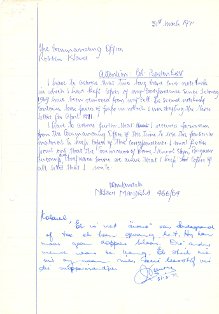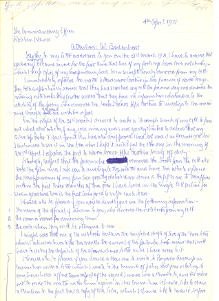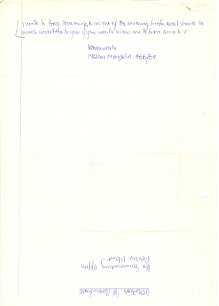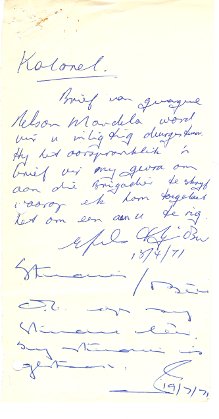December 8, 2010 – Nelson Mandela is known for being meticulous in his notetaking and recordkeeping and while in prison would always write a draft copy of every letter that he sent in a series of exercise books. In late March 1971 two of these hardcover notebooks were taken from his cell on Robben Island by a warder.
Mr Mandela immediately took it up with the authorities in an effort to have the books returned. He wrote two letters requesting that the matter be looked into, a correspondence which lends insight into the approach of the prison authorities at the time.
In his first letter to Colonel Badenhorst Mr Mandela wrote, “I have to advise that two long hardcover notebooks in which I have kept copies of my correspondence since February 1969 have been removed from my cell.”
He went on to explain that he had permission from the commanding officer to keep copies of his correspondence and that General Steyn, Brigadier Aucamp, Chief Warder Fourie and the Commissioner of Prisons were all aware that he kept copies of his letters. In response, a senior prison service official wrote to the colonel saying that he was aware of the missing articles and wasn’t particularly concerned about their disappearance.
Mr Mandela then followed up with a second letter in which he reiterated that his notebooks had gone missing and that, since his first letter, he had discovered that one of his pens was also missing.
He said: “I strongly suspect that the person who removed the books from the cell also took the pen and I ask you to investigate the matter and have this article replaced. The disappearance of my pen has greatly disturbed me. Mine is the fifth one to disappear within the first three months of this year. I have lived in the single cell section for seven years and this is the first time for us to suffer such losses.”
His letters of complaint were ignored. Unbeknownst to him, the notebooks had been passed on by the prison authorities to the Security Police for ‘decoding’.
Verne Harris, head of the Memory Programme at the Nelson Mandela Foundation, recently explained what this incident reveals about Mr Mandela: “He believed that in prison, every small struggle contributes to the bigger struggle, and he was a masterful practitioner of the art.”
The two notebooks were finally returned to Mr Mandela in 2004 by a former security policeman and both were used in the writing of his latest book Conversations with Myself.
The Nelson Mandela Foundation’s Memory Programme is dedicated to documenting resources from the life and times of Mr Mandela and giving members of the public access to this history.
Harris emphasised the importance of documenting and archiving these stories from Mr Mandela’s life, saying, “These small incidents cast light on the larger processes of struggle.”



